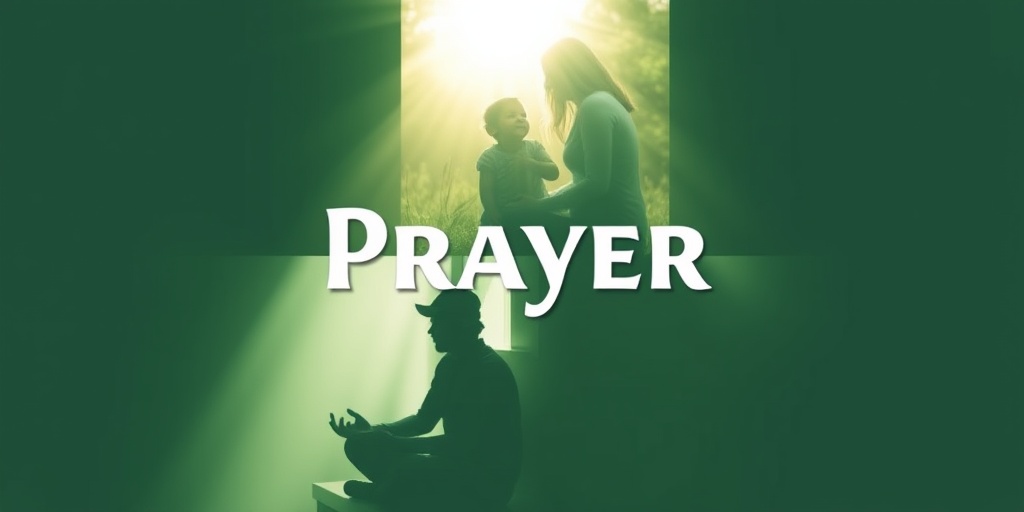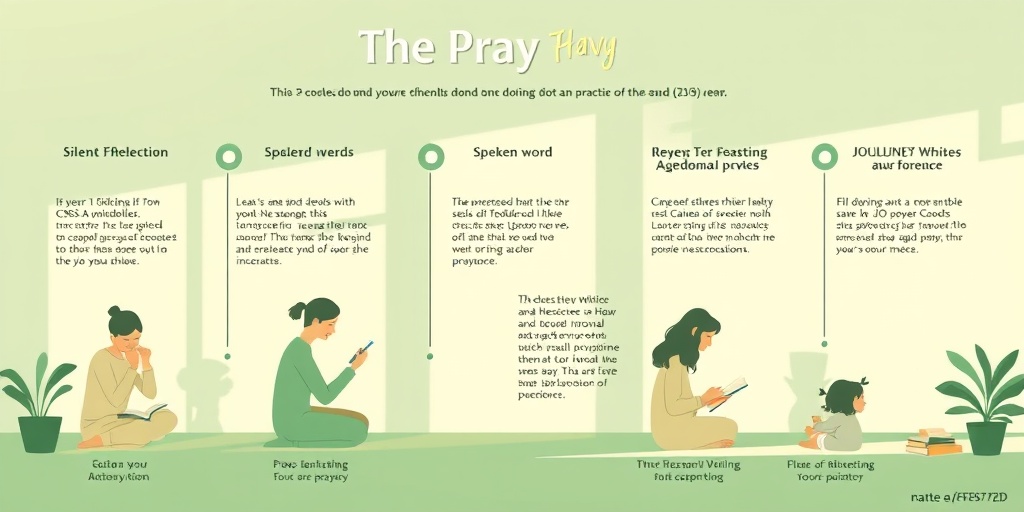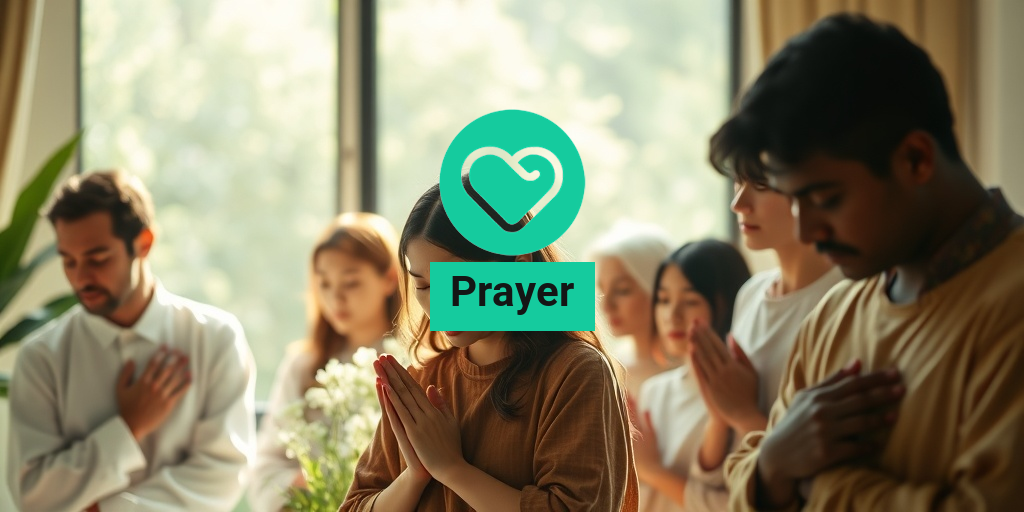What Is Prayer?
Prayer is a profound practice that transcends cultures and religions, serving as a means of communication with a higher power or the divine. At its core, prayer is an expression of faith, hope, and gratitude, allowing individuals to connect with their spirituality and seek guidance or solace. Whether through structured rituals or spontaneous conversations, prayer can take many forms, including morning prayer, night prayer, and specific prayers like the Lord’s Prayer or birthday prayer.
The Essence of Prayer
So, what exactly is prayer? It can be defined as a solemn request for help or expression of thanks addressed to God or another deity. In many religions, including Islam, prayer is a fundamental practice, with specific prayer times designated throughout the day. For instance, Muslims observe five daily prayers: Fajr (pre-dawn), Dhuhr (midday), Asr (afternoon), Maghrib (sunset), and Isha (night). Each of these prayers serves as a reminder of faith and a moment to pause and reflect.
Different Types of Prayer
Prayer can be categorized into various types, each serving a unique purpose:
- Supplication (Dua): Personal requests made to God, often for guidance or assistance.
- Intercessory Prayer: Praying on behalf of others, seeking blessings or healing for them.
- Thanksgiving: Expressing gratitude for blessings received.
- Confession: Acknowledging wrongdoings and seeking forgiveness.
Regardless of the type, the act of praying can foster a sense of peace and connection, making it a vital aspect of many people’s lives.
Benefits of Prayer
The benefits of prayer extend beyond spiritual fulfillment; they encompass mental, emotional, and even physical well-being. Engaging in regular prayer can lead to numerous positive outcomes, making it a valuable practice for individuals seeking balance and tranquility in their lives.
Spiritual Connection
One of the most significant benefits of prayer is the deepened spiritual connection it fosters. By dedicating time to prayer, individuals can cultivate a sense of closeness to their faith and the divine. This connection can provide comfort during challenging times and reinforce a sense of purpose in life.
Mental Clarity and Focus
Prayer can also enhance mental clarity and focus. Taking a moment to pause and reflect through prayer allows individuals to clear their minds, reducing stress and anxiety. This practice can be particularly beneficial during busy days or when facing difficult decisions. For those observing prayer times, such as the Fajr prayer or Asr prayer, these moments of reflection can serve as a reset, promoting mindfulness and intentionality.
Emotional Healing
Many people turn to prayer as a source of emotional healing. Whether it’s a prayer for healing or simply a moment of gratitude, prayer can help individuals process their feelings and find solace. The act of expressing emotions through prayer can lead to catharsis, allowing for a healthier emotional state.
Community and Support
Prayer can also strengthen community bonds. Group prayers, whether in a religious setting or among friends and family, create a sense of belonging and support. This communal aspect of prayer can be particularly uplifting, as individuals come together to share their hopes, fears, and aspirations.
Physical Health Benefits
Interestingly, studies have shown that prayer can have positive effects on physical health as well. Regular prayer has been linked to lower blood pressure, reduced stress levels, and improved overall well-being. Engaging in prayer can promote relaxation and a sense of peace, which are essential for maintaining good health.
In conclusion, prayer is a multifaceted practice that offers a wealth of benefits, from spiritual connection to emotional healing and even physical health improvements. Whether you observe prayer times or engage in spontaneous prayer, the act of connecting with the divine can enrich your life in profound ways. For more insights on health and wellness, consider exploring resources like Yesil Health AI at yesilhealth.com, where you can find evidence-based answers to your health questions. 🙏✨

Types of Prayer
Prayer is a profound practice that transcends cultures and religions, serving as a means of communication with the divine. While the essence of prayer remains the same, its forms can vary significantly. Here, we explore various types of prayer, each with its unique purpose and significance.
1. Supplication (Dua)
Supplication, or dua, is a personal prayer where individuals ask for guidance, help, or forgiveness. This type of prayer is often spontaneous and can be made at any time. It reflects a deep sense of humility and reliance on a higher power. Many people find comfort in making dua during challenging times, seeking strength and clarity.
2. Intercessory Prayer
Intercessory prayer involves praying on behalf of others. This type of prayer is common in many religious traditions, where individuals ask for blessings, healing, or support for friends, family, or even strangers. It fosters a sense of community and compassion, as it encourages individuals to think beyond themselves.
3. Thanksgiving Prayer
Thanksgiving prayers are expressions of gratitude towards the divine for blessings received. These prayers can be formal or informal and are often part of religious services. A simple morning prayer of thanks can set a positive tone for the day, reminding individuals of the good in their lives.
4. Confessional Prayer
Confessional prayer is a way to seek forgiveness for wrongdoings. This type of prayer encourages self-reflection and accountability, allowing individuals to acknowledge their mistakes and seek reconciliation. It is often accompanied by a commitment to change and improve oneself.
5. Liturgical Prayer
Liturgical prayers are structured and often recited during formal worship services. These prayers, such as the Lord’s Prayer or the Our Father prayer, are integral to many religious traditions. They provide a sense of unity among congregants and connect individuals to their faith’s history and teachings.
6. Contemplative Prayer
Contemplative prayer focuses on silence and meditation, allowing individuals to connect with the divine on a deeper level. This type of prayer encourages mindfulness and presence, often leading to profound insights and peace. It can be practiced through various methods, including breath awareness and visualization.
7. Group Prayer
Group prayer brings individuals together to pray collectively, fostering a sense of community and shared faith. Whether in a church, mosque, or home, group prayer can amplify the spiritual experience and create a supportive environment. Many find strength in the collective energy of daily prayer sessions.
Prayer and Mental Health
The act of praying can have a significant impact on mental health, offering numerous benefits that contribute to overall well-being. Engaging in prayer can be a powerful tool for coping with stress, anxiety, and depression.
1. Stress Relief
Prayer can serve as a form of stress relief, providing individuals with a moment of peace and reflection. Taking time to engage in fajr prayer or any other form of prayer allows individuals to step away from daily pressures and focus on their spiritual connection. This practice can lead to reduced levels of cortisol, the stress hormone, promoting a sense of calm.
2. Enhanced Emotional Resilience
Regular prayer can enhance emotional resilience, helping individuals navigate life’s challenges with greater ease. By fostering a sense of hope and purpose, prayer encourages individuals to view difficulties as opportunities for growth. This perspective can be particularly beneficial during tough times, such as illness or loss.
3. Improved Focus and Clarity
Prayer often involves moments of silence and reflection, which can improve focus and mental clarity. Engaging in practices like night prayer or morning prayer can help individuals set intentions for the day, leading to increased productivity and a more positive mindset.
4. Community Support
Participating in group prayers fosters a sense of belonging and community, which is essential for mental health. Knowing that others are praying for you, such as during maghrib prayer, can provide comfort and support, reducing feelings of isolation and loneliness.
5. Spiritual Connection
Prayer nurtures a spiritual connection that can be deeply fulfilling. This connection can provide individuals with a sense of purpose and meaning in life, which is crucial for mental well-being. Engaging in prayer regularly can help individuals feel grounded and centered, even amidst chaos.
In conclusion, prayer is a multifaceted practice that offers various forms and profound benefits for mental health. Whether through personal supplication or communal worship, the act of praying can enhance emotional resilience, provide stress relief, and foster a sense of community. 🌟

Prayer in Different Cultures
Prayer is a universal practice that transcends borders, languages, and cultures. It serves as a means of communication with the divine, offering solace, guidance, and a sense of community. Let’s explore how prayer manifests in various cultures around the world.
1. Prayer in Christianity
In Christianity, prayer is a fundamental aspect of faith. It can take many forms, from the Lord’s Prayer—a model of prayer taught by Jesus—to spontaneous prayers of gratitude or supplication. Christians often gather for communal prayers during services, while personal prayers can be made at any time. The morning prayer and night prayer are common practices, allowing believers to start and end their day with reflection and connection to God.
2. Islamic Prayer
In Islam, prayer, or Salat, is one of the Five Pillars of Islam and is performed five times a day. Each prayer has a specific time, including Fajr (pre-dawn), Dhuhr (midday), Asr (afternoon), Maghrib (sunset), and Isha (night). The Islamic prayer times are determined by the position of the sun, and many Muslims rely on local prayer times apps or websites to stay informed. The act of praying is not just a ritual; it is a way to cultivate mindfulness and discipline in daily life.
3. Hindu Prayer
Hinduism encompasses a rich tapestry of prayer practices, often involving rituals, chants, and offerings to deities. Puja is a common form of worship that includes prayers, flowers, and food offerings. Many Hindus also recite mantras, such as the Gayatri Mantra, to invoke spiritual energy and connect with the divine. Morning prayers, or Sandhya Vandana, are particularly significant, marking the transition from night to day.
4. Indigenous Prayer Practices
Indigenous cultures around the world have their own unique prayer traditions, often deeply intertwined with nature and community. For example, Native American prayers may involve rituals that honor the earth, ancestors, and the spirit world. These prayers are often accompanied by songs, dances, and offerings, reflecting a profound respect for the interconnectedness of all life.
5. Secular and Personal Prayer
In modern society, many individuals engage in secular forms of prayer or meditation, focusing on personal reflection and mindfulness rather than religious context. This can include practices like journaling, guided meditation, or simply taking a moment of silence to express gratitude or seek clarity. These practices can be beneficial for mental health, providing a sense of peace and grounding in a fast-paced world.
How to Pray Effectively
Whether you are new to prayer or looking to deepen your practice, there are several ways to enhance your prayer experience. Here are some tips on how to pray effectively:
1. Set a Dedicated Time and Space
Creating a specific time and space for prayer can help you focus and cultivate a routine. Whether it’s early in the morning or before bed, find a quiet place where you can connect without distractions. This could be a designated prayer room or simply a comfortable corner in your home. 🕊️
2. Be Present and Mindful
Effective prayer requires your full attention. Take a few deep breaths to center yourself before you begin. Being present allows you to engage more deeply with your thoughts and feelings. Consider using a prayer journal to jot down your intentions or reflections, which can help you stay focused. 📖
3. Use Structured Prayers or Spontaneous Words
Some people find comfort in structured prayers, such as the Our Father prayer or other traditional prayers. Others may prefer to speak from the heart, expressing their thoughts and feelings in their own words. Both approaches are valid; choose what resonates with you. 🙏
4. Incorporate Gratitude
Starting or ending your prayer with expressions of gratitude can shift your mindset and enhance your overall experience. Reflect on the blessings in your life, no matter how small, and acknowledge them in your prayer. This practice can foster a sense of positivity and contentment. 🌼
5. Be Open to Guidance
Prayer is not just about asking for things; it’s also about being open to receiving guidance and insight. After you pray, take a moment to listen and reflect. You may find that answers come in unexpected ways, whether through intuition, signs, or the support of others. 🌟
By understanding the diverse practices of prayer across cultures and implementing effective techniques, you can enrich your spiritual journey and foster a deeper connection with the divine.

Prayer and Community
Prayer is not just a personal act; it is a powerful communal experience that fosters connection, support, and unity among individuals. Whether in a religious setting or a casual gathering, the act of praying together can strengthen bonds and create a sense of belonging.
The Importance of Community Prayer
When people come together to pray, they share their hopes, fears, and aspirations. This collective energy can be incredibly uplifting. Community prayer serves several purposes:
- Support System: In times of distress, communal prayer can provide emotional and spiritual support. Knowing that others are praying for you can be a source of comfort.
- Shared Beliefs: Engaging in prayer with others who share similar beliefs reinforces those beliefs and encourages spiritual growth.
- Social Interaction: Community prayer gatherings often lead to social interactions, helping individuals build friendships and networks.
Types of Community Prayer
There are various forms of community prayer that cater to different needs and preferences:
- Group Worship Services: Many religious institutions hold regular services where congregants come together to pray, sing, and reflect.
- Prayer Circles: Smaller, informal gatherings where individuals share personal prayer requests and pray for one another.
- Special Events: Events like prayer vigils or community prayer days can mobilize large groups for a common cause, such as healing or social justice.
In cities like Dubai or Riyadh, prayer times are often synchronized in community settings, allowing individuals to come together for prayers like Fajr, Dhuhr, and Maghrib. This synchronization not only enhances the spiritual experience but also fosters a sense of community among participants. 🌍
Incorporating Prayer into Daily Life
Integrating prayer into your daily routine can significantly enhance your spiritual well-being and provide a sense of peace and purpose. Here are some practical ways to make prayer a regular part of your life.
Establish a Routine
Creating a consistent prayer schedule can help you stay committed. Consider the following:
- Morning Prayer: Start your day with a morning prayer to set a positive tone. This could be a simple thank you for the day ahead or a more structured prayer like The Lord’s Prayer.
- Midday Reflection: Take a moment during your lunch break for a quick prayer or meditation. This can help you refocus and recharge for the rest of the day.
- Evening Gratitude: Before bed, reflect on your day and offer a prayer of gratitude. This practice can promote a sense of peace and closure.
Utilizing Technology
In our fast-paced world, technology can be a helpful ally in maintaining your prayer life. Consider using:
- Prayer Apps: Many apps provide daily prayers, reminders for prayer times, and even community features to connect with others.
- Online Resources: Websites and social media platforms often share prayers, inspirational messages, and community events.
Personalizing Your Prayer Experience
Make your prayer time meaningful by personalizing it. Here are some ideas:
- Prayer Journals: Keep a journal to write down your prayers, thoughts, and reflections. This can help you track your spiritual journey.
- Prayer for Healing: If you or someone you know is going through a tough time, dedicate specific prayers for healing and support.
- Birthday Prayers: Celebrate special occasions with dedicated prayers, such as a birthday prayer for loved ones, asking for blessings in the year ahead.
Incorporating prayer into your daily life doesn’t have to be complicated. Whether it’s a quick night prayer or a moment of reflection during the day, these practices can enrich your spiritual journey and connect you with a larger community. 🙏

Frequently Asked Questions about Prayer
What is Prayer?
Prayer is a spiritual practice that involves communicating with a higher power or deity. It can take various forms, including spoken words, silent thoughts, or meditative practices. Many people engage in daily prayer as a way to seek guidance, express gratitude, or find peace.
What are the different types of Prayer?
- Morning Prayer: Often performed at the start of the day to seek blessings and guidance.
- Fajr Prayer: The first of the five daily prayers in Islam, performed before dawn.
- Dhuhr Prayer: The midday prayer, performed after the sun has passed its zenith.
- Asr Prayer: The afternoon prayer, performed in the late afternoon.
- Maghrib Prayer: The evening prayer, performed just after sunset.
- Isha Prayer: The night prayer, performed after twilight has disappeared.
How can I find Prayer Times?
To find prayer times for your location, you can use various online resources or mobile applications. Simply search for “prayer times today” along with your city name, such as “Dubai prayer time” or “prayer time Riyadh.” Many websites provide accurate timings based on your geographical location.
What is the significance of the Lord’s Prayer?
The Lord’s Prayer, also known as Our Father Prayer, is a central prayer in Christianity. It is a model of how to pray and encompasses themes of worship, forgiveness, and guidance. Many Christians recite this prayer regularly as part of their spiritual practice.
Can I pray for healing?
Yes, many people turn to prayer for healing during times of illness or distress. It is believed that prayer can provide comfort, strength, and support, both spiritually and emotionally. You can create your own personal prayer or use established prayers focused on healing.
What is a Birthday Prayer?
A birthday prayer is a special prayer offered on someone’s birthday, expressing gratitude for their life and asking for blessings in the year ahead. It can be a personal reflection or a communal prayer shared with family and friends.
How do I incorporate Prayer into my daily routine?
Incorporating prayer into your daily routine can be simple. Here are a few tips:
- Set aside specific times for prayer, such as in the morning or before bed.
- Create a peaceful space for prayer, free from distractions.
- Use prayer apps or books to guide your practice.
- Reflect on your day and express gratitude during your prayer time.
What are some common Prayer Points?
Common prayer points include seeking guidance, asking for strength in difficult times, praying for loved ones, and expressing gratitude. You can also focus on specific needs, such as health, relationships, or personal growth.
Can I pray anywhere?
Yes, you can pray anywhere! Whether at home, in a park, or even at work, prayer can be a personal and intimate experience. Many people find solace in creating a designated prayer room or space, but it is not a requirement.
How can I stay consistent with my Prayer practice?
Staying consistent with your prayer practice can be achieved by:
- Setting reminders on your phone.
- Joining a community or group that encourages regular prayer.
- Keeping a prayer journal to track your thoughts and progress.
By understanding the various aspects of prayer, you can deepen your spiritual practice and enhance your connection with the divine.




